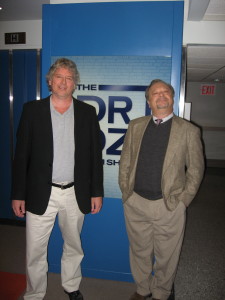I’ve written before about how I was unceremoniously relegated to the cheap seats because I wouldn’t go along with the story line on Dr. Oz a couple of years ago; it wasn’t factual and they weren’t interested in facts.
 Now, researchers report in the British Medical Journal that TV talk shows like Dr. Oz and The Doctors are full of it at least 50 per cent of the time.
Now, researchers report in the British Medical Journal that TV talk shows like Dr. Oz and The Doctors are full of it at least 50 per cent of the time.
Objective To determine the quality of health recommendations and claims made on popular medical talk shows.
Design Prospective observational study.
Setting Mainstream television media.
Sources Internationally syndicated medical television talk shows that air daily (The Dr Oz Show and The Doctors).
Interventions Investigators randomly selected 40 episodes of each of The Dr Oz Show and The Doctors from early 2013 and identified and evaluated all recommendations made on each program. A group of experienced evidence reviewers independently searched for, and evaluated as a team, evidence to support 80 randomly selected recommendations from each show.
Main outcomes measures Percentage of recommendations that are supported by evidence as determined by a team of experienced evidence reviewers. Secondary outcomes included topics discussed, the number of recommendations made on the shows, and the types and details of recommendations that were made.
Results We could find at least a case study or better evidence to support 54% (95% confidence interval 47% to 62%) of the 160 recommendations (80 from each show). For recommendations in The Dr Oz Show, evidence supported 46%, contradicted 15%, and was not found for 39%. For recommendations in The Doctors, evidence supported 63%, contradicted 14%, and was not found for 24%. Believable or somewhat believable evidence supported 33% of the recommendations on The Dr Oz Show and 53% on The Doctors. On average, The Dr Oz Show had 12 recommendations per episode and The Doctors 11. The most common recommendation category on The Dr Oz Show was dietary advice (39%) and on The Doctors was to consult a healthcare provider (18%). A specific benefit was described for 43% and 41% of the recommendations made on the shows respectively. The magnitude of benefit was described for 17% of the recommendations on The Dr Oz Show and 11% on The Doctors. Disclosure of potential conflicts of interest accompanied 0.4% of recommendations.
Conclusions Recommendations made on medical talk shows often lack adequate information on specific benefits or the magnitude of the effects of these benefits. Approximately half of the recommendations have either no evidence or are contradicted by the best available evidence. Potential conflicts of interest are rarely addressed. The public should be skeptical about recommendations made on medical talk shows.
